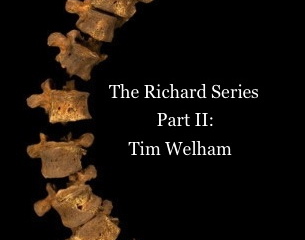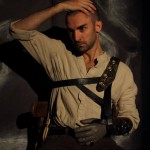
In the second installment of our Richard Series, we confer with Tim Welham, who is currently reviving his one-man adaptation of Richard III, ‘Crookback’. Originally wowing Toronto audiences in 2010, ‘Crookback’ plays this month at The Etcetera Theatre in London, England where Tim recently completed his Masters at The Central School of Speech & Drama. Playing not only Richard, but every part in the play, Tim brings a unique and multifaceted perspective to our Richard Series.
1-What was your relationship with the audience while playing Richard and did it change throughout the play?
We (director Megan Watson & myself) used Richard’s unique soliloquies, and his incredibly intimate relationship with the audience, as a springboard for the concept of our adaptation. So right from “Now is the winter”, we invite the audience into Richard’s mind, and the soliloquies act as a kind of confessional with the audience members. For me, the beginning monologue is always the hardest. Since each audience is different, each performance requires many subtle shifts in intention, focus, and address. I tend to speak directly to audience members when I play Richard, and some people find this quite disconcerting at the beginning of the show! So it takes a while to warm the audience to the concept and for them to feel comfortable inside Richard’s head. However, as the play progresses and the action grows, I’ve noticed most people end up encouraging Richard, and willing him to victory. It’s an interesting change – and one that Shakespeare deals with very well in his writing. By the time we get to the final soliloquy, after the famous nightmare on the eve of the Battle of Bosworth, Richard asks many more questions of the audience and is, essentially, begging them for a response – he is desperate for answers. Shakespeare’s use of short (sometimes incomplete) sentences and questions forces Richard into a kind of self-reflective state, and in turn jarrs the audience into reconsidering their own views of this very troubled and lonely man.
2-How did you develop the physicality of the part and what informed your choice?
The physicality! Well, for me to first begin creating a unique body, I needed to research what other actors had done before. The most memorable are probably Laurence Olivier’s 1955 hopping crow (mainly because it was one of the first to be preserved on film), and Antony Sher’s 1984 spider for the RSC (Royal Shakespeare Company). Olivier’s is a difficult shadow to dodge, since his portrayal is so prevalent in our cultural consciousness, and Sher’s version is probably the pinnacle of physical dexterity. So, I went down the middle. Taking clues from Shakespeare’s text (not historical references), I ended up with my left arm in a sling, walking with a slight limp of the left leg, and curving my head and spine slightly to the left as well. The idea was to portray a slight compression & twist in Richard’s spine – perhaps the result of scoliosis? – that slowly amplified throughout the play. All of my clues came from the text, and mainly from names and descriptions of Richard by other characters.
3-Did anything surprise you about playing the role?
At the beginning of the process, I had an image of Richard as a gleeful, mischievous murderer without much of a moral compass. I thought he would spend most of his time in a state of high adventure – like Commander of a frigate on the high seas chasing a pirate ship. In the end, I discovered that much of Richard’s drive to life comes from a place of incredible loneliness and sadness. He has been, essentially, disowned by his mother and shunned by the rest of his family. He has never really known love. I found this to be the core of Richard’s character: his desperate need for love, comfort and understanding. And this came to a head during his final soliloquy on the eve of Bosworth where he says “I shall despair, there is no creature loves me, / And if I die, no soul will pity me.” He is human, and like all of us, wants to love and be loved in return. His tragedy is perhaps that it took him too long to realize that.
Next in our Richard Series, Tom McCamus recounts discovering the role of Richard III at The Stratford Festival in 2002. Ruff’s production of ‘Richard III’ is playing Aug 13th-Sept 1st in Toronto’s Withrow Park, all info at www.shakespeareintheruff.com

